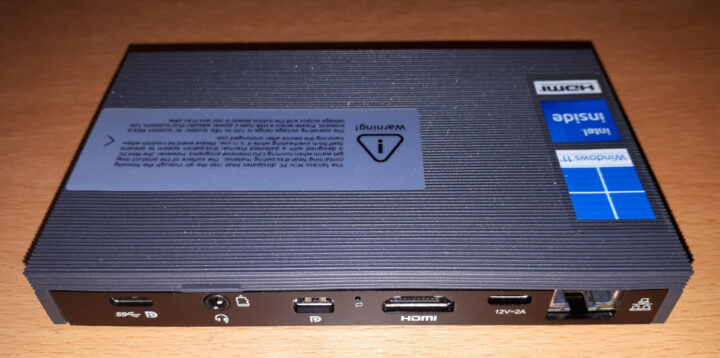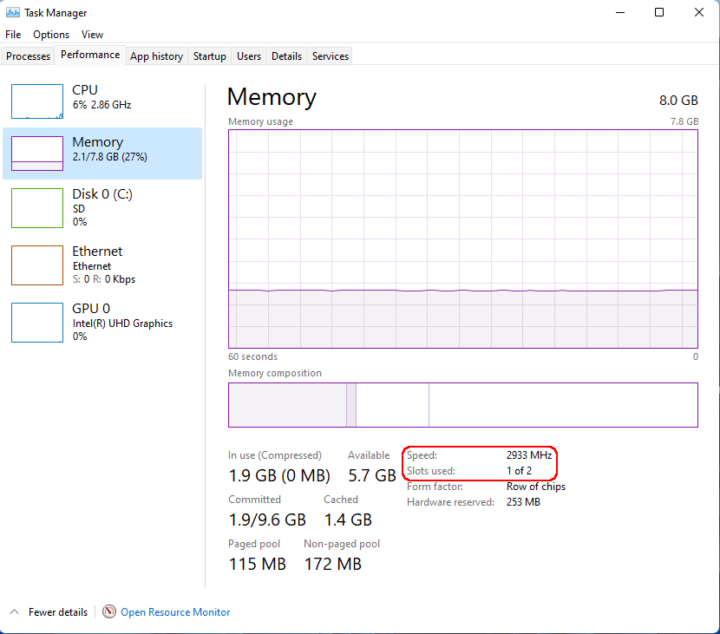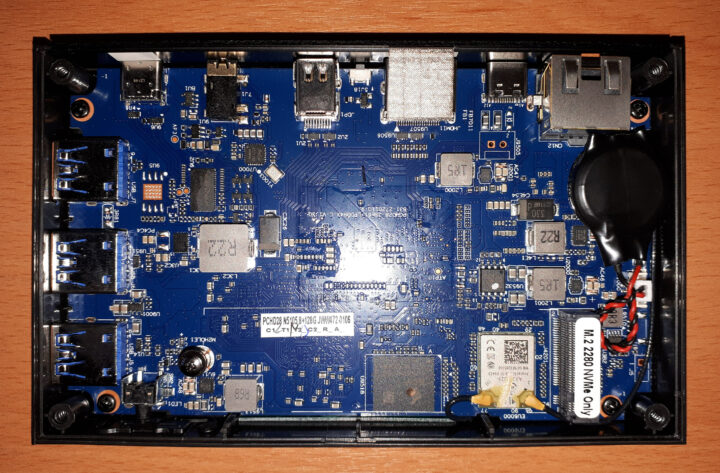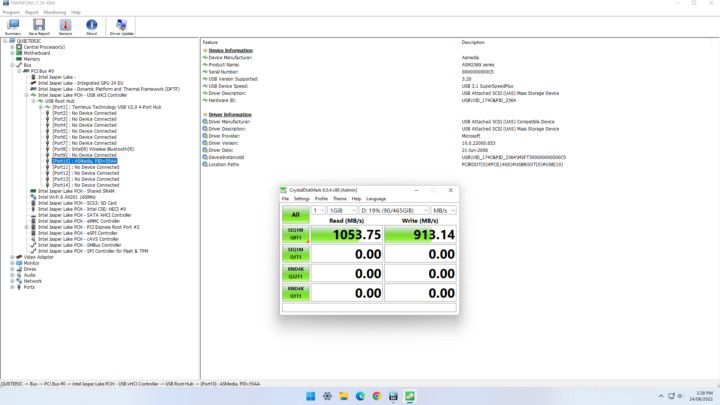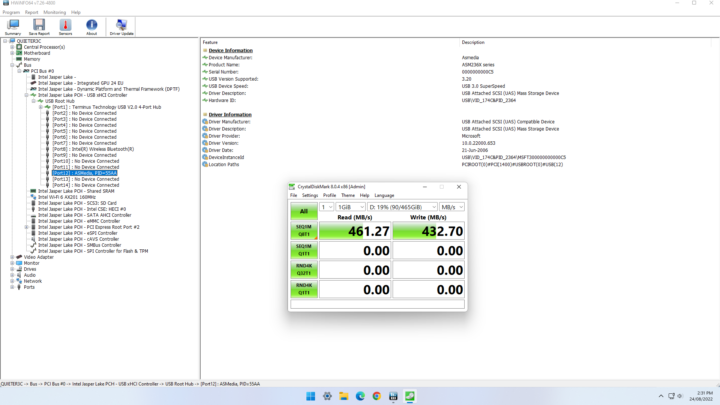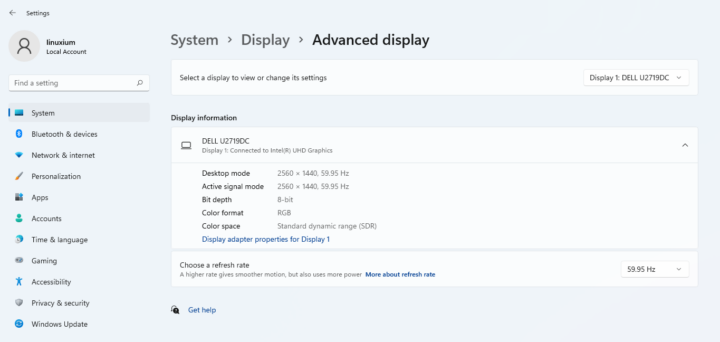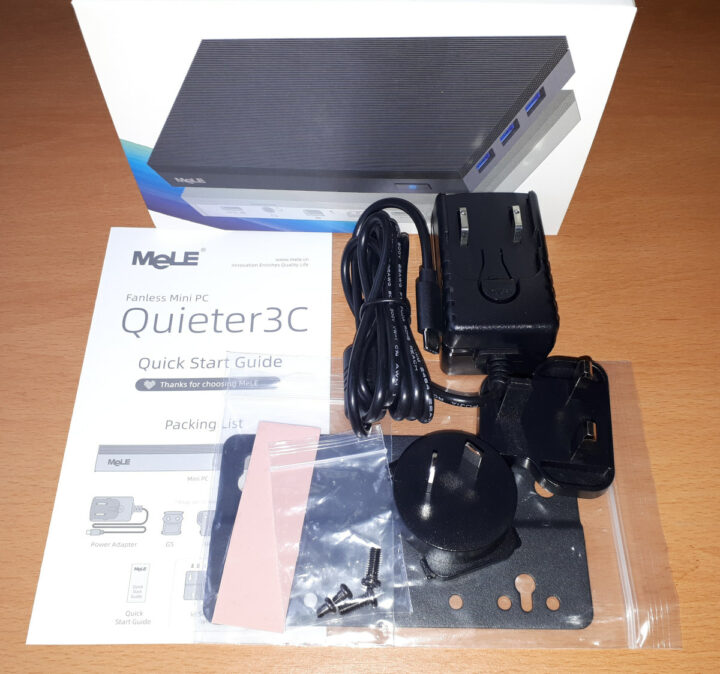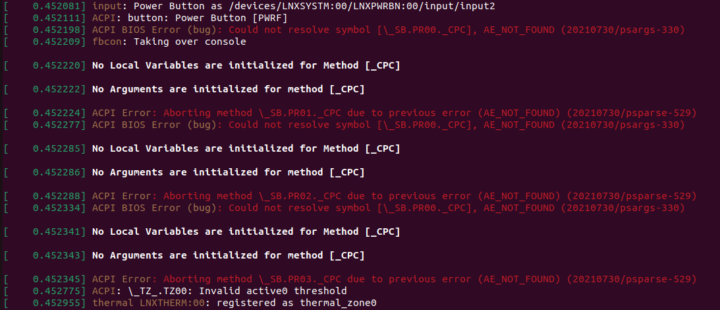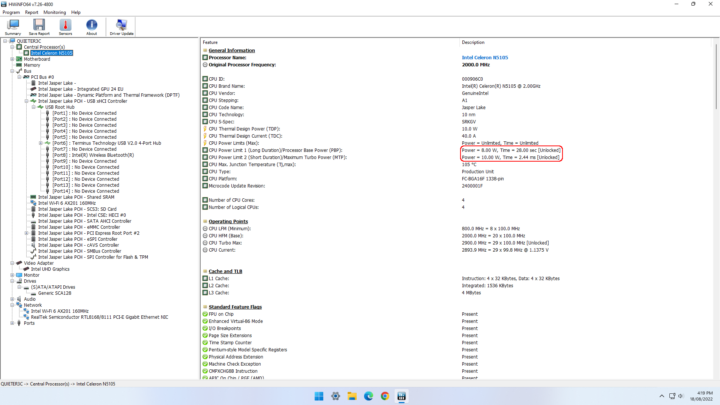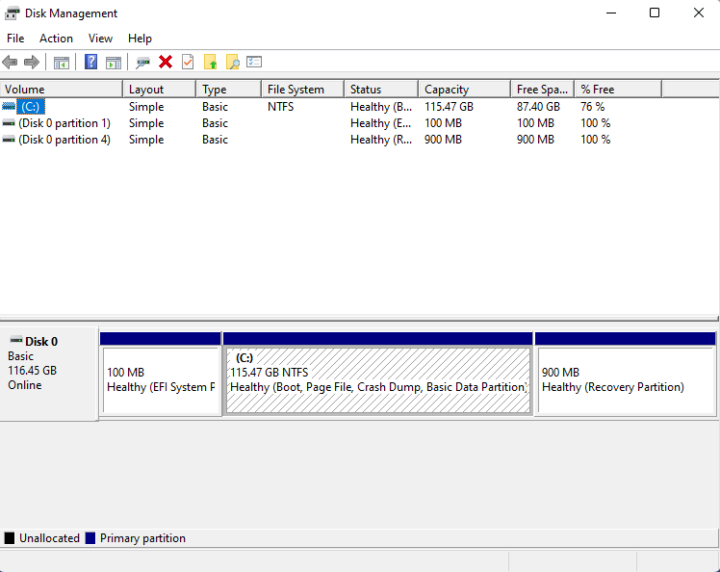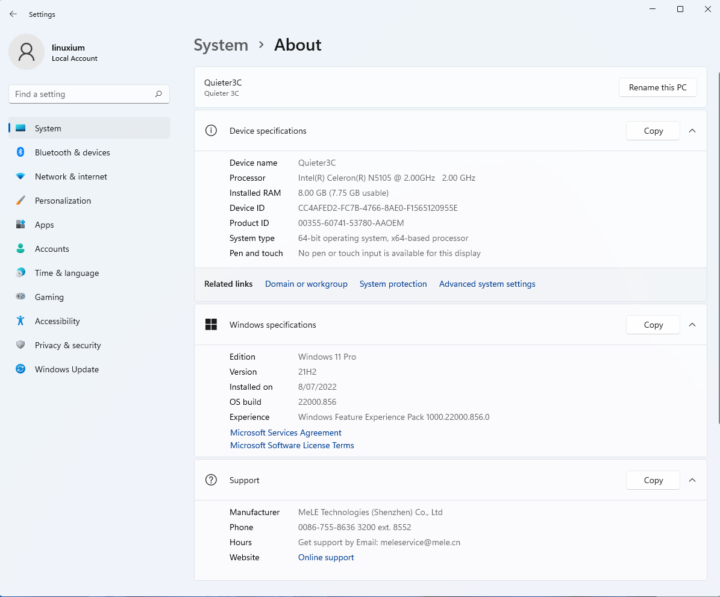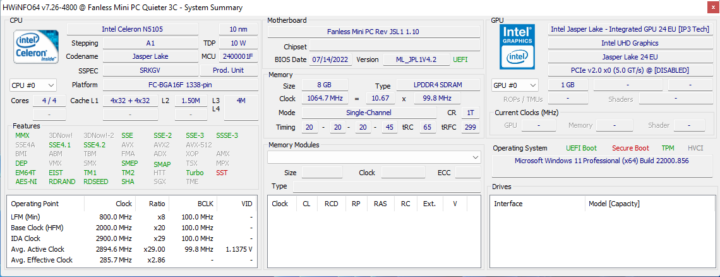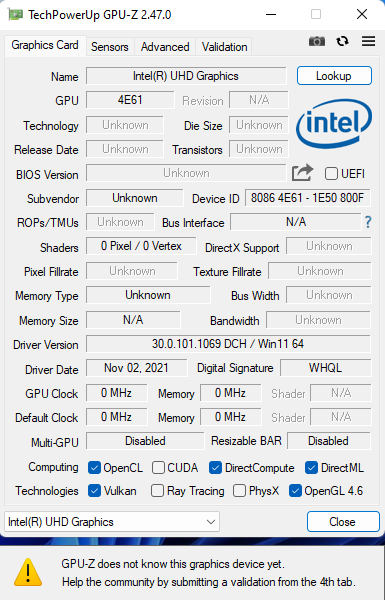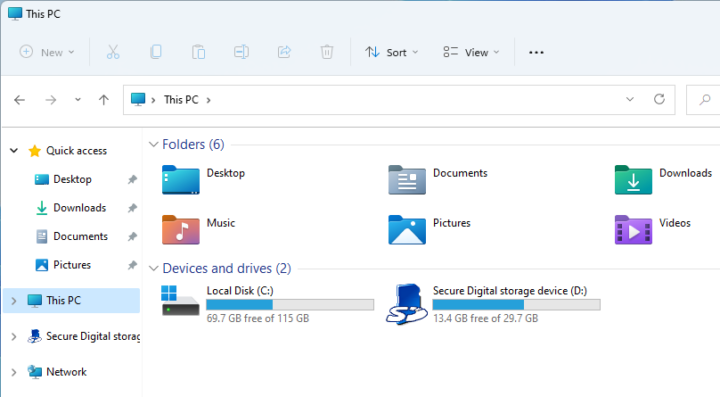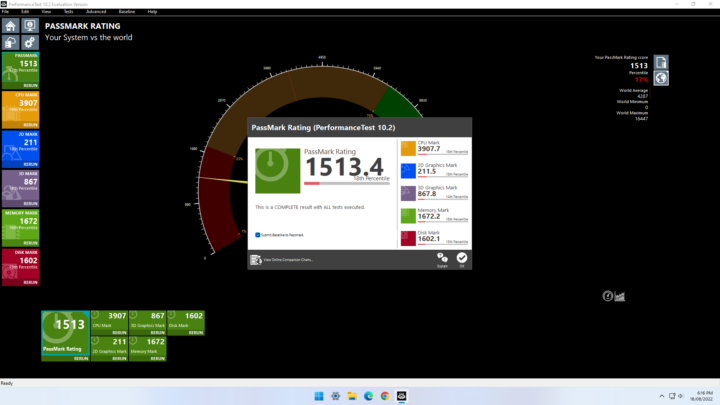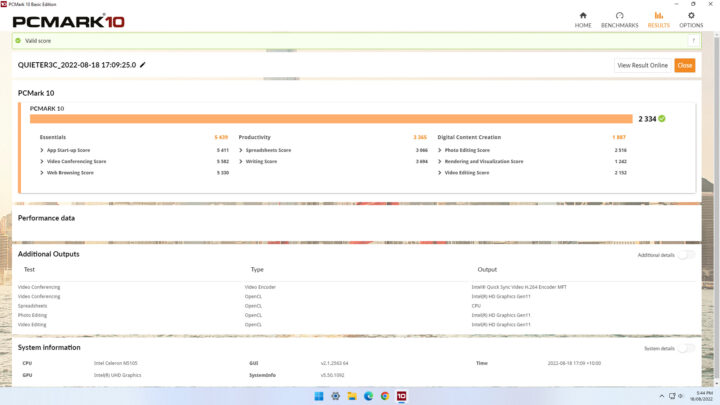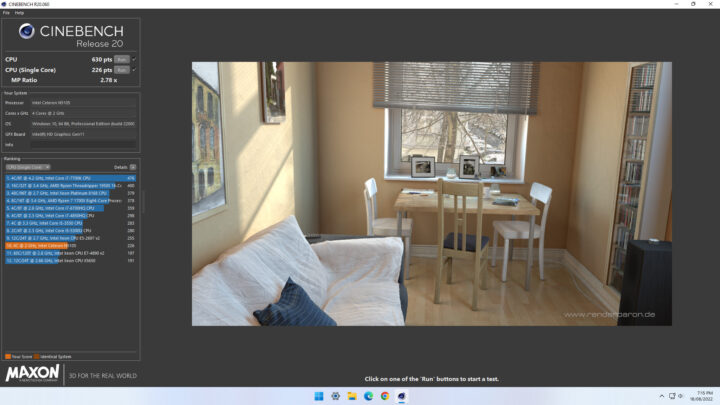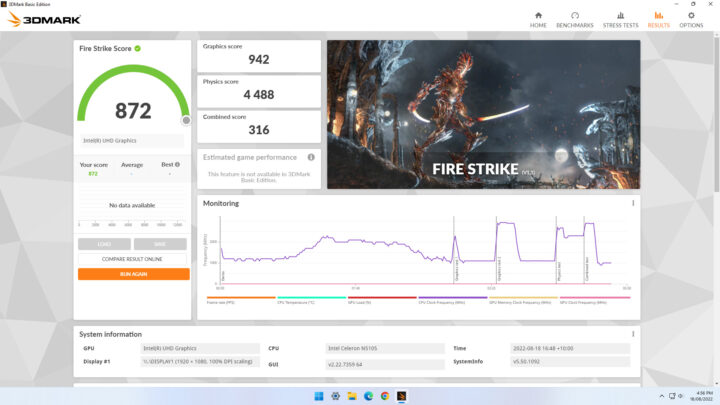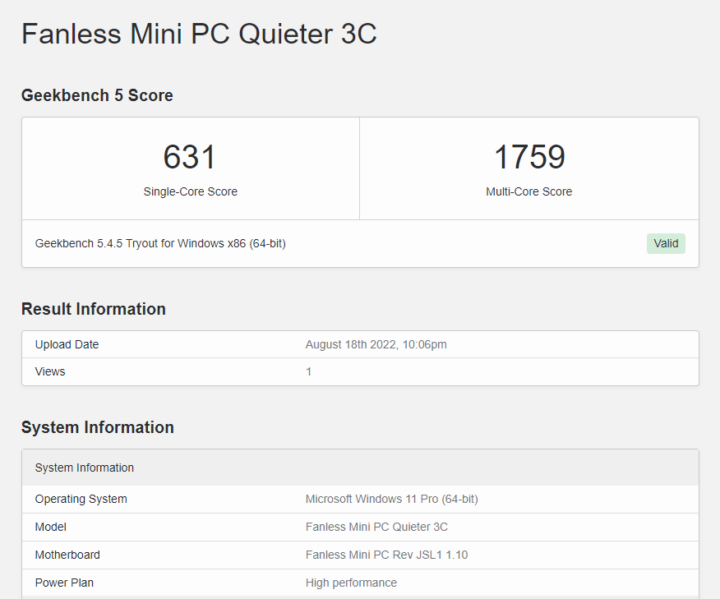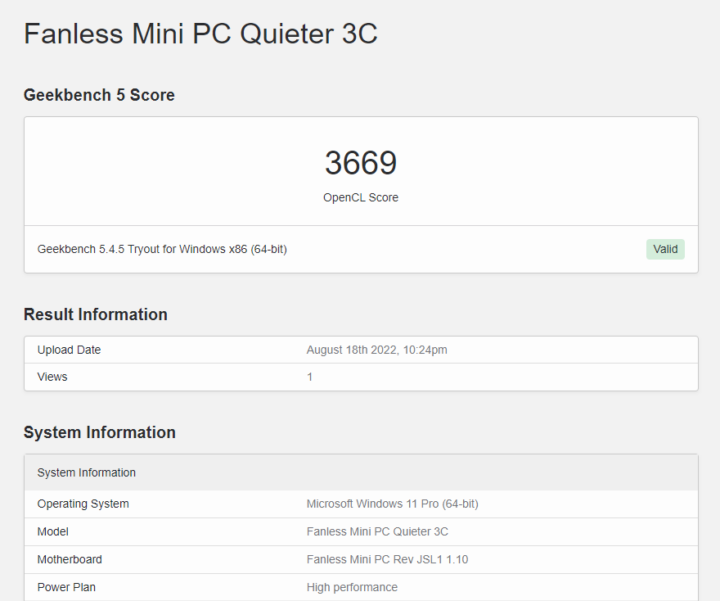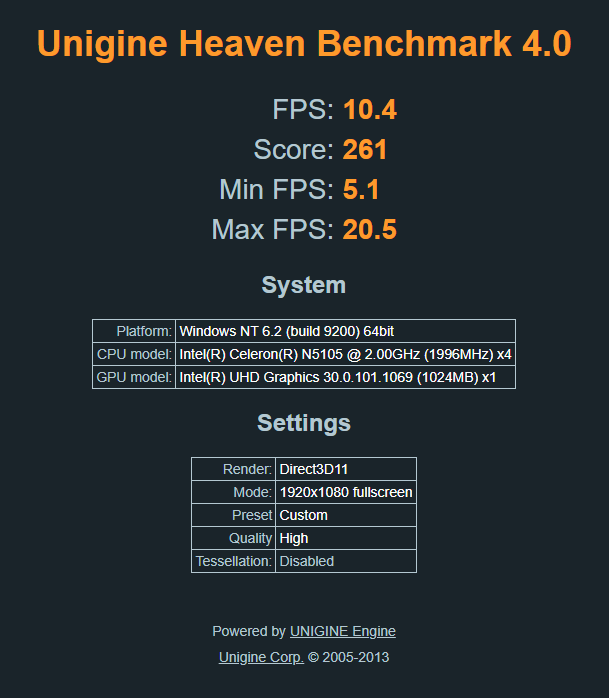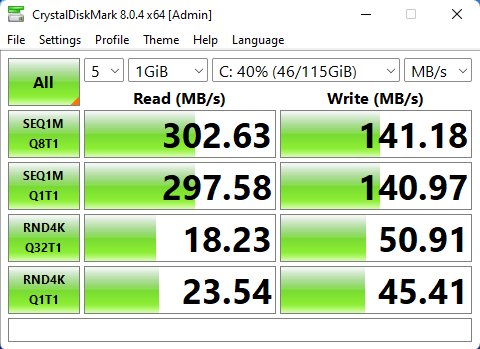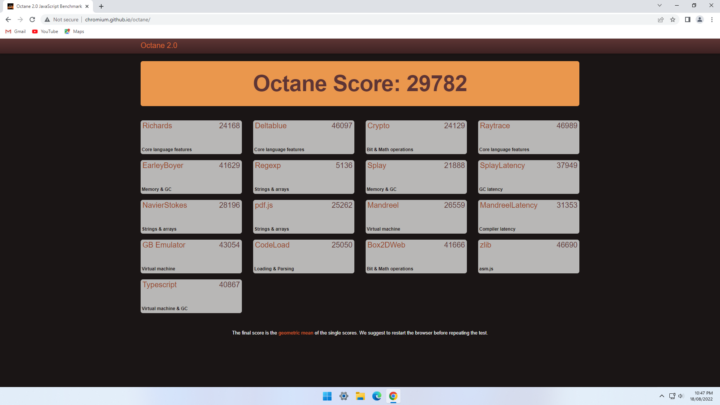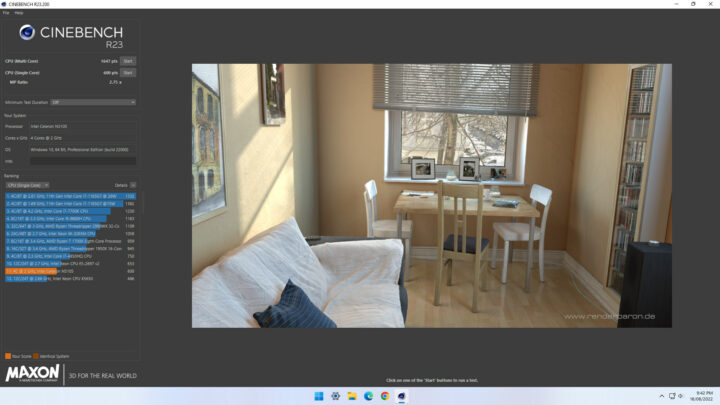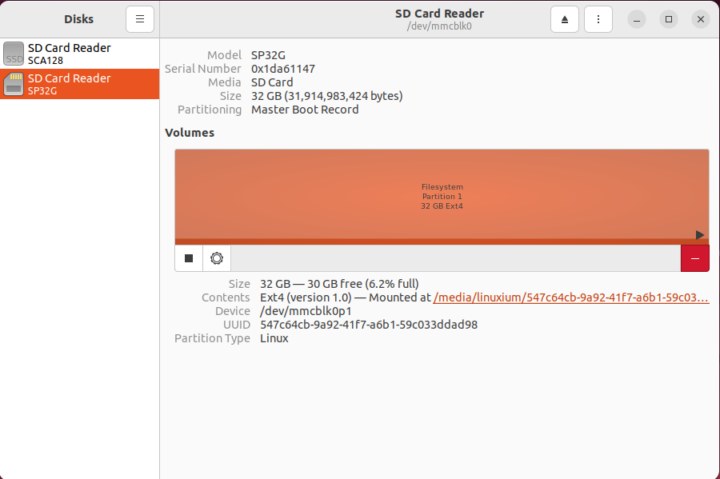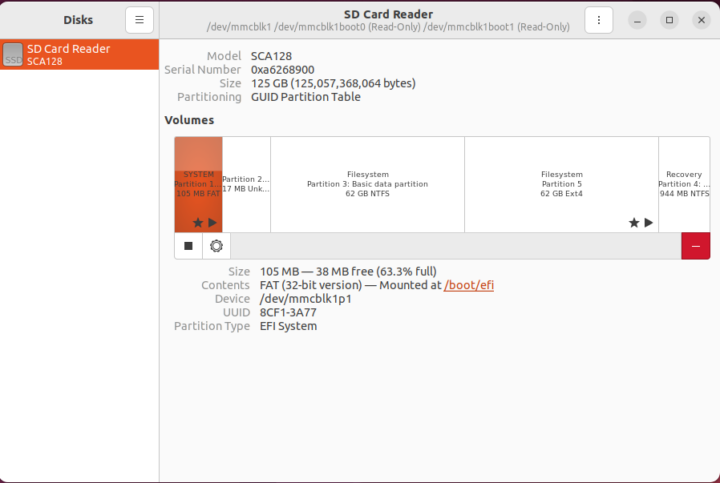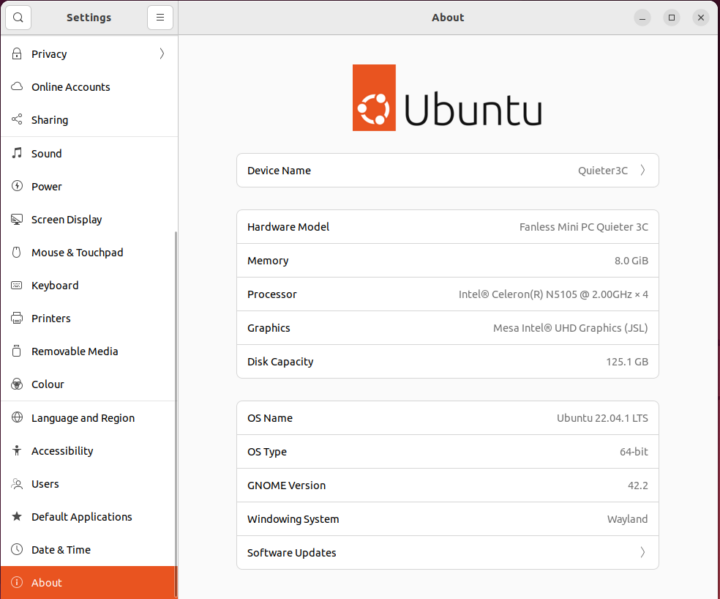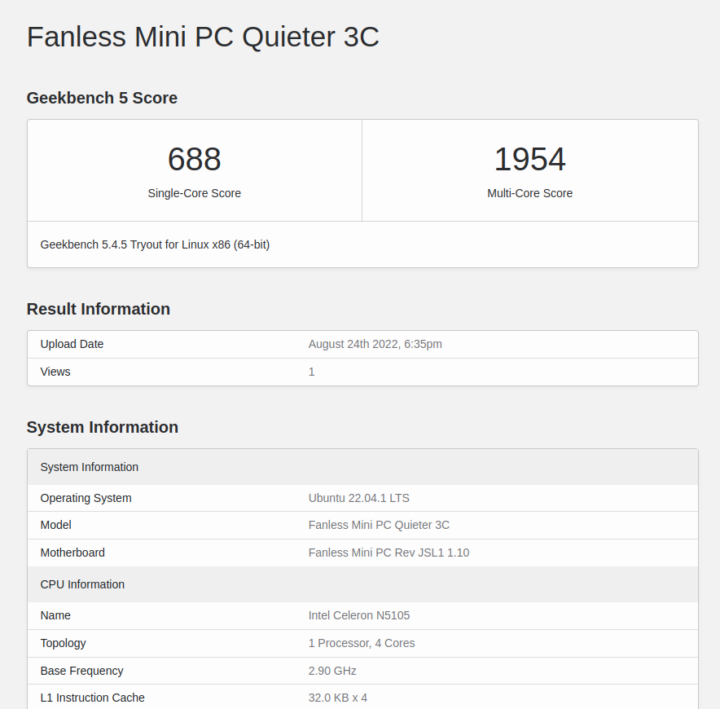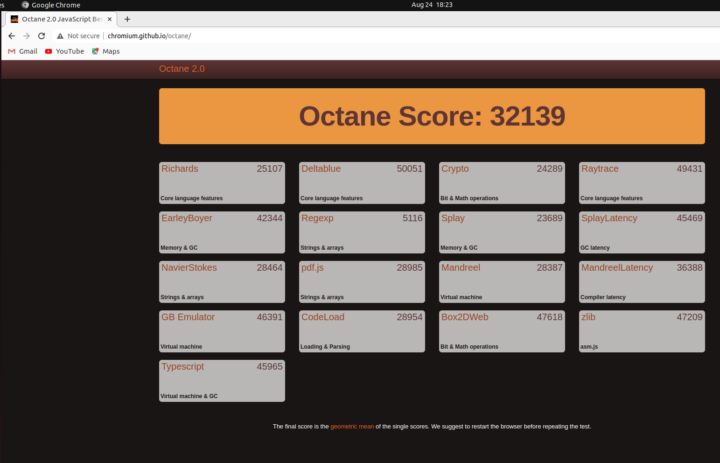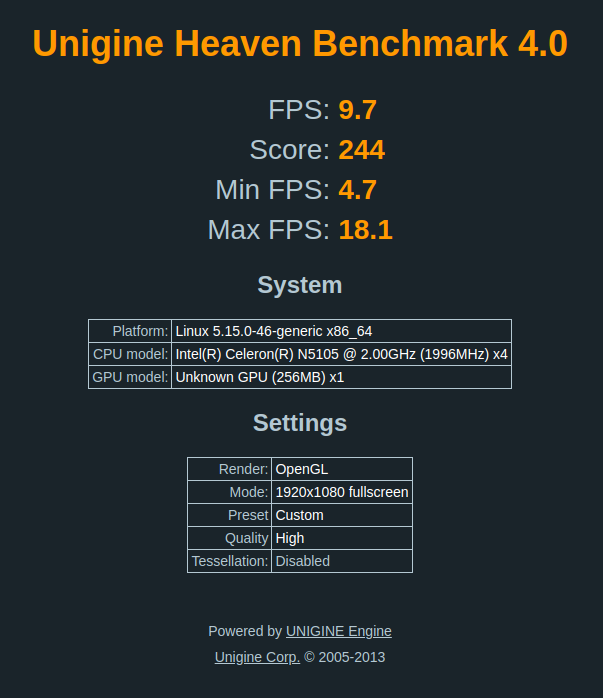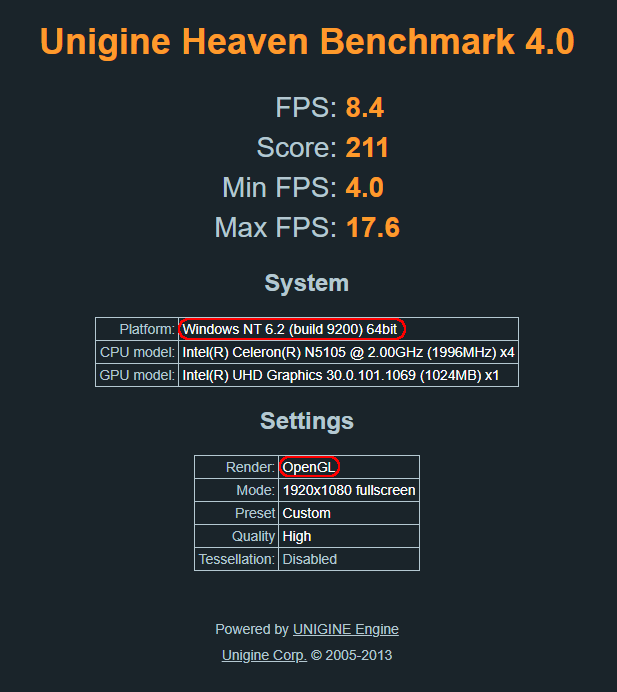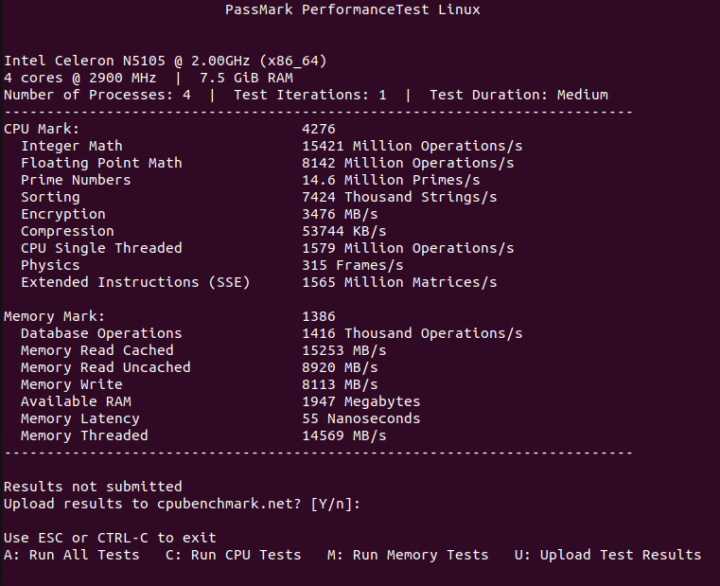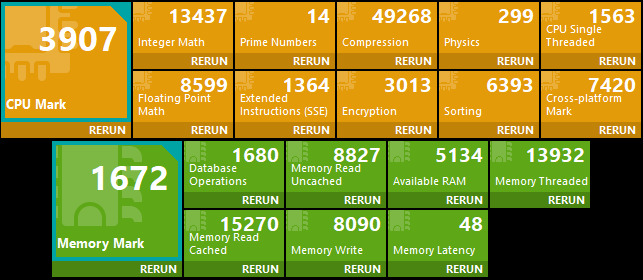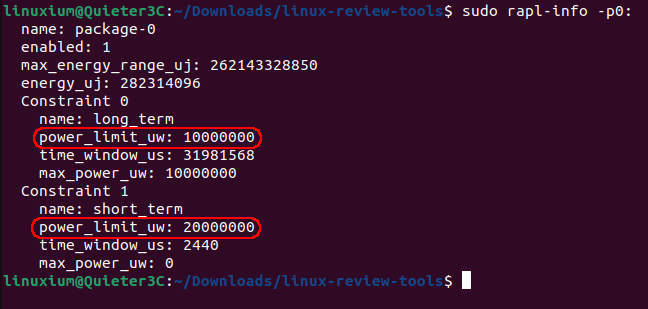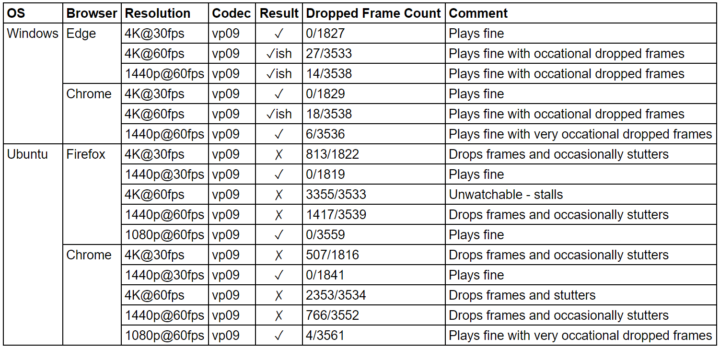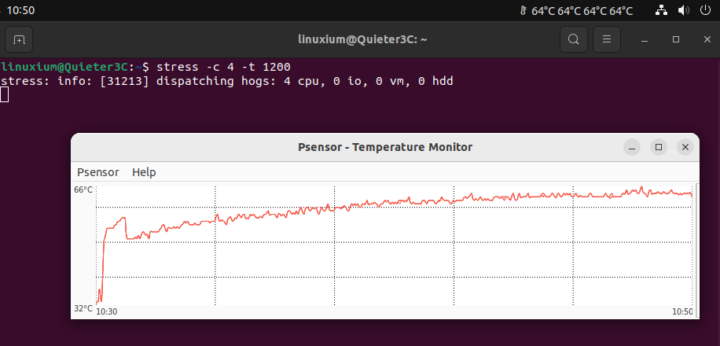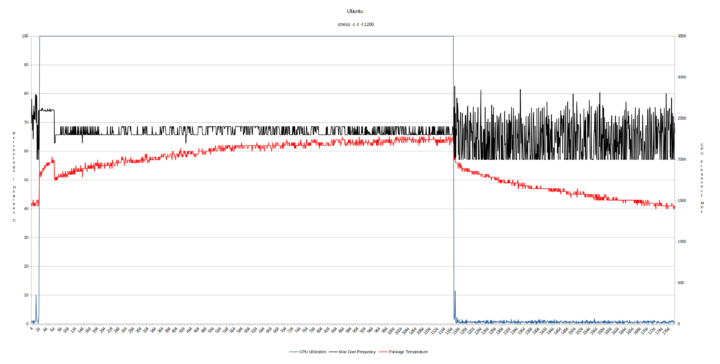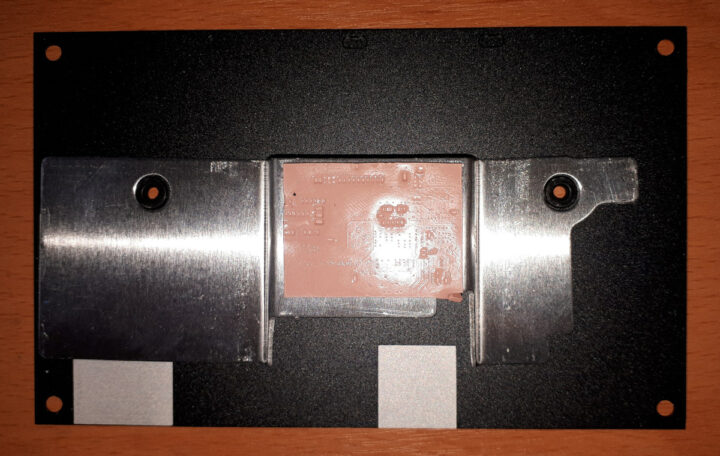MeLE’s newly launched Quieter3C is an update to their earlier Quieter3Q product which replaces one of the Type-A USB ports with a Type-C USB port and includes both power delivery and video display output, together with changing one of the HDMI ports to a mini DisplayPort. MeLE kindly sent one for review and given these are the only differences I’m only going to take a cursory look at performance benchmarks together with looking at these new features.
MeLE Quieter3C hardware overview
The MeLE Quieter3C is physically the same size as the Quieter3Q and consists of a 131 x 81 x 18.3mm (5.16 x 3.19 x 0.72 inches) rectangular plastic case with a metal base plate. The top half of the case has the characteristic fine grooves that mimic the fins of a heat spreader and is made of plastic rather than metal to allow reception to the WiFi antennas as one is directly connected to it. As a passively cooled mini PC, it uses Intel’s 10 nm Jasper Lake N5105 processor which is a quad-core 4-thread 2.00 GHz Celeron processor boosting to 2.90 GHz with Intel’s UHD Graphics.
The front panel just has an illuminated power button whilst the rear panel now includes a Type-C USB port, a headphone jack, a microSD card slot, a mini DisplayPort, an HDMI port, a Type-C USB port for power only, and a gigabit Ethernet port. The left panel has a Kensington security slot and the right panel like before has three Type-A USB ports.
The review model included a soldered-on 128GB eMMC drive and soldered-on 8GB LPDDR4 3200 MHz single-channel memory that was configured to run at 2933 MHz:
Additionally, there is a soldered-on WiFi 6 (or 802.11ax) Intel AX201 card as well as the ability to add an M.2 2280 NVMe SSD drive:
The specifications state:
and lists all of the USB ports as 3.0 so I tested them together with the Type-C USB port using a Samsung 980 PRO PCle 4.0 NVMe M.2 SSD housed in a ‘USB to M.2 NVMe adapter’ (ORICO M2PAC3-G20 M.2 NVMe SSD Enclosure) which showed that the first two USB ports on the right side were actually ‘USB 3.1’ (USB 3.2 Gen 2×1 i.e. 10 Gbit/s):
and that only the third port together with the rear Type-C USB port was ‘USB 3.0’ (USB 3.2 Gen 1×1 i.e. 5 Gbit/s):
This model’s new Type-C USB port also supports video output through ‘Alternate Mode’:
so along with the mini DisplayPort:
and the remaining HDMI port there is now support for triple 4K displays.
I also confirmed that the new Type-C USB port supported power delivery by connecting the MeLE Quieter3C directly to a Dell monitor without separately connecting power:
Box contents
In the box, you get a power adapter and cord together with a plug adapter appropriate for your country, a quick start guide, and a thermal pad for applying to an M.2 drive. Also included was the optionally available VESA mounting bracket together with a small packet of miscellaneous screws:
Review Methodology
When reviewing mini PCs, I typically look at their performance under both Windows and Linux (Ubuntu) and compare them against some of the more recently released mini PCs. I now review using Windows 11 version 21H2 and Ubuntu 22.04.1 LTS. I test with a selection of commonly used Windows benchmarks and/or equivalents for Linux
Prior to benchmarking, I perform all necessary installations and updates to run the latest version of the OS. I also capture some basic details of the device for each OS.
Installation Issues
When booting Ubuntu 22.04.1, there was the usual UEFI (BIOS) error being reported in the ‘dmesg’ that appears common with Jasper Lake mini PCs and whose significance of which has not been determined:
Windows 11 performance on MeLE Quieter3C
The MeLE Quieter3C came installed with a licensed copy of Windows 11 Pro version 21H2 which after applying updates was build 22000.856. A quick look at the hardware information shows it is aligned to the specification:
Similar to other Jasper Lake mini PCs the iGPU showed limited details in HWiNFO and was unknown to GPU-Z:
A brief check showed working audio, Wi-Fi, Bluetooth, Ethernet, mini DP, HDMI and micro-SD card:
I then set the power mode to ‘High performance’ and ran my standard set of benchmarking tools to look at performance under Windows:
I also tested Cinebench R23:
All these results can then be compared with other recent mini PCs:
with the Quieter3C performing very similarly to the Quieter3Q.
Ubuntu 22.04 Performance
After shrinking the Windows partition in half and creating a new partition I installed Ubuntu as dual boot using an Ubuntu 22.04.1 ISO. After installation and updates a brief check showed working audio, Wi-Fi, Bluetooth, Ethernet, mini DP, HDMI, and microSD card:
The key hardware information under Ubuntu 22.04.1 is as follows:
|
1 2 3 4 5 6 7 8 9 10 11 12 13 14 15 16 17 18 19 20 21 22 23 24 25 26 27 28 29 30 31 32 33 34 35 36 37 38 39 40 41 42 43 44 45 46 47 48 49 50 51 52 53 54 55 56 57 58 59 60 61 62 63 64 65 66 67 68 69 70 71 72 73 74 75 76 77 78 79 80 81 82 83 84 85 86 87 88 89 90 91 92 93 94 95 96 97 98 99 100 101 102 103 104 105 106 107 108 109 110 111 112 113 114 115 116 117 118 119 120 121 122 123 124 125 126 127 128 129 130 131 132 133 134 135 136 137 138 139 140 141 142 143 144 145 146 147 148 149 150 151 152 153 154 155 156 157 158 159 160 161 162 163 164 165 166 167 168 169 170 171 172 173 174 175 176 177 178 179 180 181 182 183 184 185 186 187 188 189 190 191 192 193 194 195 196 197 198 199 200 201 202 203 204 205 206 207 208 209 210 211 212 213 214 215 216 217 218 219 220 221 222 223 224 225 226 227 228 229 230 231 232 233 234 235 236 237 238 239 240 241 242 243 244 245 246 247 248 249 250 |
linuxium@Quieter3C:~$ lsb_release -a Distributor ID: Ubuntu Description: Ubuntu 22.04.1 LTS Release: 22.04 Codename: jammy linuxium@Quieter3C:~$ linuxium@Quieter3C:~$ uname -a Linux Quieter3C 5.15.0-46-generic #49-Ubuntu SMP Thu Aug 4 18:03:25 UTC 2022 x86_64 x86_64 x86_64 GNU/Linux linuxium@Quieter3C:~$ linuxium@Quieter3C:~$ inxi -Fzc0y-1 System: Kernel: 5.15.0-46-generic x86_64 bits: 64 Console: pty pts/1 Distro: Ubuntu 22.04.1 LTS (Jammy Jellyfish) Machine: Type: Mini-pc System: Fanless Mini PC product: Quieter 3C v: N/A serial: <filter> Mobo: Fanless Mini PC model: Rev JSL1 1.10 serial: <filter> UEFI: American Megatrends LLC. v: ML_JPL1V4.2 date: 07/14/2022 CPU: Info: quad core model: Intel Celeron N5105 bits: 64 type: MCP cache: L2: 1.5 MiB Speed (MHz): avg: 2361 min/max: 800/2900 cores: 1: 2783 2: 1615 3: 2870 4: 2179 Graphics: Device-1: Intel JasperLake [UHD Graphics] driver: i915 v: kernel Display: server: X.Org v: 1.22.1.1 driver: gpu: i915 note: X driver n/a resolution: 1920x1080~60Hz OpenGL: renderer: Mesa Intel UHD Graphics (JSL) v: 4.6 Mesa 22.0.5 Audio: Device-1: Intel driver: snd_hda_intel Sound Server-1: ALSA v: k5.15.0-46-generic running: yes Sound Server-2: PulseAudio v: 15.99.1 running: yes Sound Server-3: PipeWire v: 0.3.48 running: yes Network: Device-1: Intel Wi-Fi 6 AX201 160MHz driver: iwlwifi IF: wlp0s20f3 state: down mac: <filter> Device-2: Realtek RTL8111/8168/8411 PCI Express Gigabit Ethernet driver: r8169 IF: enp1s0 state: up speed: 1000 Mbps duplex: full mac: <filter> Bluetooth: Device-1: Intel AX201 Bluetooth type: USB driver: btusb Report: hciconfig ID: hci0 state: up address: <filter> bt-v: 3.0 Drives: Local Storage: total: 116.47 GiB used: 9.21 GiB (7.9%) ID-1: /dev/mmcblk1 model: SCA128 size: 116.47 GiB Partition: ID-1: / size: 56.53 GiB used: 9.15 GiB (16.2%) fs: ext4 dev: /dev/mmcblk1p5 ID-2: /boot/efi size: 96 MiB used: 59.3 MiB (61.8%) fs: vfat dev: /dev/mmcblk1p1 Swap: Alert: No swap data was found. Sensors: System Temperatures: cpu: 27.8 C mobo: N/A Fan Speeds (RPM): N/A Info: Processes: 225 Uptime: 12m Memory: 7.52 GiB used: 1.38 GiB (18.4%) Shell: new-review-test inxi: 3.3.13 linuxium@Quieter3C:~$ linuxium@Quieter3C:~$ df -h Filesystem Size Used Avail Use% Mounted on tmpfs 770M 2.0M 768M 1% /run /dev/mmcblk1p5 57G 9.2G 45G 18% / tmpfs 3.8G 0 3.8G 0% /dev/shm tmpfs 5.0M 4.0K 5.0M 1% /run/lock /dev/mmcblk1p1 96M 60M 37M 62% /boot/efi tmpfs 770M 2.5M 768M 1% /run/user/1000 linuxium@Quieter3C:~$ linuxium@Quieter3C:~$ lsblk -a NAME MAJ:MIN RM SIZE RO TYPE MOUNTPOINTS loop0 7:0 0 4K 1 loop /snap/bare/5 loop1 7:1 0 62M 1 loop /snap/core20/1587 loop2 7:2 0 400.8M 1 loop /snap/gnome-3-38-2004/112 loop3 7:3 0 284K 1 loop /snap/snapd-desktop-integration/14 loop4 7:4 0 91.7M 1 loop /snap/gtk-common-themes/1535 loop5 7:5 0 163.3M 1 loop /snap/firefox/1635 loop6 7:6 0 47M 1 loop /snap/snapd/16292 loop7 7:7 0 45.9M 1 loop /snap/snap-store/582 loop8 7:8 0 0B 0 loop mmcblk1 179:0 0 116.5G 0 disk ├─mmcblk1p1 179:1 0 100M 0 part /boot/efi ├─mmcblk1p2 179:2 0 16M 0 part ├─mmcblk1p3 179:3 0 57.7G 0 part ├─mmcblk1p4 179:4 0 900M 0 part └─mmcblk1p5 179:5 0 57.7G 0 part / mmcblk1boot0 179:8 0 4M 1 disk mmcblk1boot1 179:16 0 4M 1 disk linuxium@Quieter3C:~$ linuxium@Quieter3C:~$ sudo lshw -C cpu *-cpu description: CPU product: Intel(R) Celeron(R) N5105 @ 2.00GHz vendor: Intel Corp. physical id: b bus info: cpu@0 version: 6.156.0 serial: <filter> slot: U3E1 size: 2897MHz capacity: 2900MHz width: 64 bits clock: 100MHz capabilities: lm fpu fpu_exception wp vme de pse tsc msr pae mce cx8 apic sep mtrr pge mca cmov pat pse36 clflush dts acpi mmx fxsr sse sse2 ss ht tm pbe syscall nx rdtscp x86-64 constant_tsc art arch_perfmon pebs bts rep_good nopl xtopology nonstop_tsc cpuid aperfmperf tsc_known_freq pni pclmulqdq dtes64 monitor ds_cpl vmx est tm2 ssse3 sdbg cx16 xtpr pdcm sse4_1 sse4_2 x2apic movbe popcnt tsc_deadline_timer aes xsave rdrand lahf_lm 3dnowprefetch cpuid_fault epb cat_l2 cdp_l2 ssbd ibrs ibpb stibp ibrs_enhanced tpr_shadow vnmi flexpriority ept vpid ept_ad fsgsbase tsc_adjust smep erms rdt_a rdseed smap clflushopt clwb intel_pt sha_ni xsaveopt xsavec xgetbv1 xsaves split_lock_detect dtherm ida arat pln pts hwp hwp_notify hwp_act_window hwp_epp hwp_pkg_req umip waitpkg gfni rdpid movdiri movdir64b md_clear flush_l1d arch_capabilities cpufreq configuration: cores=4 enabledcores=4 microcode=603979811 threads=4 linuxium@Quieter3C:~$ linuxium@Quieter3C:~$ sudo lshw -C memory *-firmware description: BIOS vendor: American Megatrends International, LLC. physical id: 0 version: ML_JPL1V4.2 date: 07/14/2022 size: 64KiB capacity: 8MiB capabilities: pci upgrade shadowing cdboot bootselect socketedrom edd int13floppy1200 int13floppy720 int13floppy2880 int5printscreen int14serial int17printer acpi usb biosbootspecification uefi *-memory description: System Memory physical id: 4 slot: System board or motherboard size: 8GiB *-bank:0 description: Row of chips LPDDR4 Synchronous 3200 MHz (0.3 ns) vendor: SK Hynix physical id: 0 serial: <filter> slot: Controller0-ChannelA size: 8GiB width: 32 bits clock: 3200MHz (0.3ns) *-bank:1 description: Project-Id-Version: lshwReport-Msgid-Bugs-To: FULL NAME <EMAIL@ADDRESS>PO-Revision-Date: 2012-02-02 13:04+0000Last-Translator: Joel Addison <jaddi27@gmail.com>Language-Team: English (Australia) <en_AU@li.org>MIME-Version: 1.0Content-Type: text/plain; charset=UTF-8Content-Transfer-Encoding: 8bitX-Launchpad-Export-Date: 2022-07-21 13:07+0000X-Generator: Launchpad (build 025a39fd866a641b6ae33074cda0d02a2c712d38)Project-Id-Version: lshwReport-Msgid-Bugs-To: FULL NAME <EMAIL@ADDRESS>PO-Revision-Date: 2012-02-02 13:04+0000Last-Translator: Joel Addison <jaddi27@gmail.com>Language-Team: English (Australia) <en_AU@li.org>MIME-Version: 1.0Content-Type: text/plain; charset=UTF-8Content-Transfer-Encoding: 8bitX-Launchpad-Export-Date: 2022-07-21 13:07+0000X-Generator: Launchpad (build 025a39fd866a641b6ae33074cda0d02a2c712d38) [empty] physical id: 1 slot: Controller0-ChannelB-DIMM0 *-cache:0 description: L1 cache physical id: 8 slot: L1 Cache size: 256KiB capacity: 256KiB capabilities: synchronous internal write-back configuration: level=1 *-cache:1 description: L2 cache physical id: 9 slot: L2 Cache size: 1536KiB capacity: 1536KiB capabilities: synchronous internal write-back unified configuration: level=2 *-cache:2 description: L3 cache physical id: a slot: L3 Cache size: 4MiB capacity: 4MiB capabilities: synchronous internal write-back unified configuration: level=3 *-memory UNCLAIMED description: RAM memory product: Intel Corporation vendor: Intel Corporation physical id: 14.2 bus info: pci@0000:00:14.2 version: 01 width: 64 bits clock: 33MHz (30.3ns) capabilities: pm cap_list configuration: latency=0 resources: iomemory:600-5ff iomemory:600-5ff memory:6001128000-6001129fff memory:600112e000-600112efff linuxium@Quieter3C:~$ linuxium@Quieter3C:~$ free -mh total used free shared buff/cache available Mem: 7.5Gi 790Mi 2.4Gi 303Mi 4.3Gi 6.2Gi Swap: 0B 0B 0B linuxium@Quieter3C:~$ linuxium@Quieter3C:~$ sudo lshw -C network *-network description: Wireless interface product: Wi-Fi 6 AX201 160MHz vendor: Intel Corporation physical id: 14.3 bus info: pci@0000:00:14.3 logical name: wlp0s20f3 version: 01 serial: <filter> width: 64 bits clock: 33MHz capabilities: pm msi pciexpress msix bus_master cap_list ethernet physical wireless configuration: broadcast=yes driver=iwlwifi driverversion=5.15.0-46-generic firmware=66.f1c864e0.0 QuZ-a0-hr-b0-66.u latency=0 link=no multicast=yes wireless=IEEE 802.11 resources: iomemory:600-5ff irq:16 memory:6001124000-6001127fff *-network description: Ethernet interface product: RTL8111/8168/8411 PCI Express Gigabit Ethernet Controller vendor: Realtek Semiconductor Co., Ltd. physical id: 0 bus info: pci@0000:01:00.0 logical name: enp1s0 version: 15 serial: <filter> size: 1Gbit/s capacity: 1Gbit/s width: 64 bits clock: 33MHz capabilities: pm msi pciexpress msix bus_master cap_list ethernet physical tp mii 10bt 10bt-fd 100bt 100bt-fd 1000bt-fd autonegotiation configuration: autonegotiation=on broadcast=yes driver=r8169 driverversion=5.15.0-46-generic duplex=full firmware=rtl8168h-2_0.0.2 02/26/15 ip=<filter> latency=0 link=yes multicast=yes port=twisted pair speed=1Gbit/s resources: irq:17 ioport:3000(size=256) memory:7fc04000-7fc04fff memory:7fc00000-7fc03fff linuxium@Quieter3C:~$ linuxium@Quieter3C:~$ sudo lshw -C display *-display description: VGA compatible controller product: JasperLake [UHD Graphics] vendor: Intel Corporation physical id: 2 bus info: pci@0000:00:02.0 logical name: /dev/fb0 version: 01 width: 64 bits clock: 33MHz capabilities: pciexpress msi pm vga_controller bus_master cap_list rom fb configuration: depth=32 driver=i915 latency=0 mode=2560x1080 resolution=2560,1080 visual=truecolor xres=2560 yres=1080 resources: iomemory:600-5ff iomemory:400-3ff irq:135 memory:6000000000-6000ffffff memory:4000000000-400fffffff ioport:4000(size=64) memory:c0000-dffff linuxium@Quieter3C:~$ linuxium@Quieter3C:~$ dmesg | grep "MMC card" [ 1.213211] mmc1: new HS400 Enhanced strobe MMC card at address 0001 linuxium@Quieter3C:~$ linuxium@Quieter3C:~$ dmesg | egrep -i sdhci\|mmc [ 0.179572] PCI: MMCONFIG for domain 0000 [bus 00-ff] at [mem 0xc0000000-0xcfffffff] (base 0xc0000000) [ 0.179572] PCI: MMCONFIG at [mem 0xc0000000-0xcfffffff] reserved in E820 [ 1.067555] sdhci: Secure Digital Host Controller Interface driver [ 1.067560] sdhci: Copyright(c) Pierre Ossman [ 1.071347] sdhci-pci 0000:00:14.5: SDHCI controller found [8086:4df8] (rev 1) [ 1.083529] mmc0: SDHCI controller on PCI [0000:00:14.5] using ADMA 64-bit [ 1.083588] sdhci-pci 0000:00:1a.0: SDHCI controller found [8086:4dc4] (rev 1) [ 1.085360] mmc1: CQHCI version 5.10 [ 1.086182] mmc1: SDHCI controller on PCI [0000:00:1a.0] using ADMA 64-bit [ 1.213191] mmc1: Command Queue Engine enabled [ 1.213211] mmc1: new HS400 Enhanced strobe MMC card at address 0001 [ 1.221189] mmcblk1: mmc1:0001 SCA128 116 GiB [ 1.224043] mmcblk1: p1 p2 p3 p4 p5 [ 1.224814] mmcblk1boot0: mmc1:0001 SCA128 4.00 MiB [ 1.225748] mmcblk1boot1: mmc1:0001 SCA128 4.00 MiB [ 1.226742] mmcblk1rpmb: mmc1:0001 SCA128 4.00 MiB, chardev (239:0) [ 3.431172] EXT4-fs (mmcblk1p5): mounted filesystem with ordered data mode. Opts: (null). Quota mode: none. [ 3.868635] EXT4-fs (mmcblk1p5): re-mounted. Opts: errors=remount-ro. Quota mode: none. linuxium@Quieter3C:~$ linuxium@Quieter3C:~$ lsusb Bus 002 Device 001: ID 1d6b:0003 Linux Foundation 3.0 root hub Bus 001 Device 003: ID 8087:0026 Intel Corp. AX201 Bluetooth Bus 001 Device 006: ID 093a:2510 Pixart Imaging, Inc. Optical Mouse Bus 001 Device 005: ID 10d5:55a4 Uni Class Technology Co., Ltd 4 Port KVMSwicther Bus 001 Device 004: ID 045e:07f8 Microsoft Corp. Wired Keyboard 600 (model 1576) Bus 001 Device 002: ID 1a40:0101 Terminus Technology Inc. Hub Bus 001 Device 001: ID 1d6b:0002 Linux Foundation 2.0 root hub linuxium@Quieter3C:~$ linuxium@Quieter3C:~$ lspci -nn 00:00.0 Host bridge [0600]: Intel Corporation Device [8086:4e24] 00:02.0 VGA compatible controller [0300]: Intel Corporation JasperLake [UHD Graphics] [8086:4e61] (rev 01) 00:04.0 Signal processing controller [1180]: Intel Corporation Dynamic Tuning service [8086:4e03] 00:14.0 USB controller [0c03]: Intel Corporation Device [8086:4ded] (rev 01) 00:14.2 RAM memory [0500]: Intel Corporation Device [8086:4def] (rev 01) 00:14.3 Network controller [0280]: Intel Corporation Wi-Fi 6 AX201 160MHz [8086:4df0] (rev 01) 00:14.5 SD Host controller [0805]: Intel Corporation Device [8086:4df8] (rev 01) 00:16.0 Communication controller [0780]: Intel Corporation Management Engine Interface [8086:4de0] (rev 01) 00:17.0 SATA controller [0106]: Intel Corporation Device [8086:4dd3] (rev 01) 00:1a.0 SD Host controller [0805]: Intel Corporation Device [8086:4dc4] (rev 01) 00:1c.0 PCI bridge [0604]: Intel Corporation Device [8086:4db9] (rev 01) 00:1f.0 ISA bridge [0601]: Intel Corporation Device [8086:4d87] (rev 01) 00:1f.3 Audio device [0403]: Intel Corporation Device [8086:4dc8] (rev 01) 00:1f.4 SMBus [0c05]: Intel Corporation JaserLake SMBus [8086:4da3] (rev 01) 00:1f.5 Serial bus controller [0c80]: Intel Corporation JaserLake SPI (flash) Controller [8086:4da4] (rev 01) 01:00.0 Ethernet controller [0200]: Realtek Semiconductor Co., Ltd. RTL8111/8168/8411 PCI Express Gigabit Ethernet Controller [10ec:8168] (rev 15) linuxium@Quieter3C:~$ |
I then set the CPU Scaling Governor to ‘performance’ and ran just a couple of Linux benchmarks:
and the latter can be directly compared to when run in Windows using the OpenGL render:
I also ran PassMark PerformanceTest Linux:
which can be directly compared to the results from when it was run on Windows:
The Ubuntu results are marginally better than the Windows ones and looking at the power profile shows that under Linux the values of ‘PL1’ and ‘PL2’ are 10 and 20 Watts respectively whilst under Windows, they are only 8 and 10 Watts:
Video playback in web browsers
For real-world testing, I played some videos in Edge and Chrome on Windows and in Firefox and Chrome on Ubuntu. On Edge the initial codec for a video is ‘av01’ however as it then typically struggles to play the video it switches to ‘vp09’ whereas Chrome always used ‘vp09’:
and again the Quieter3C performed very similarly to the Quieter3Q.
Thermals
Running a stress test on Ubuntu saw the CPU temperature rise quickly to 58°C and then drop to 50°C before slowly climbing to a peak temperature of 66°C with a maximum average temperature of 63.9°C:
If the CPU frequency is monitored during the stress test it can be seen that the initial temperature peak is caused by the CPU running at an average of 2600 MHz for the ‘PL1’ duration after which it thermal throttles and drops to an average frequency of 2340 MHz to prevent overheating:
During the stress test, the maximum temperature I recorded on the top of the device was around 54.6°C in an ambient room temperature of 12.7°C with the device not being too hot to touch.
MeLE has also stated that they have ‘improved the heat dissipation structure by adding alumina thermal conductive plate and silicon pad on the housing case’:
However, during testing, this only decreased the temperature of the top of the device by a single degree from 55.6°C on the Quieter3Q to 54.6°C on the MeLE Quieter3C. Under prolonged usage, this modification may be more noticeable.
Final Observations
The key Quieter3C improvements include replacing a Type-A USB port with a Type-C USB port and enabling both video output and power delivery through it. Swapping one of the HDMI ports for a mini DisplayPort might ease connectivity for some users whilst equally hindering others who now need an HDMI adapter. Certainly, as a passively cooled mini PC, the additional internal metal plate to improve thermal dissipation is a welcome incremental improvement.
| Highlights | Limitations |
|---|---|
| Additional Type-C USB functionality | Only functions at 5 Gbps |
| Additional mini DisplayPort | Removal of one HDMI port |
| Additional internal thermal plate | Minor thermal improvement |
I’d like to thank MeLE for providing the MeLE Quieter3C for review. It retails at around $270 for the tested configuration of 8GB/128GB on Amazon.

Ian is interested in mini PCs and helps with reviews of mini PCs running Windows, Ubuntu and other Linux operating systems. You can follow him on Facebook or Twitter.
Support CNX Software! Donate via cryptocurrencies, become a Patron on Patreon, or purchase goods on Amazon or Aliexpress


